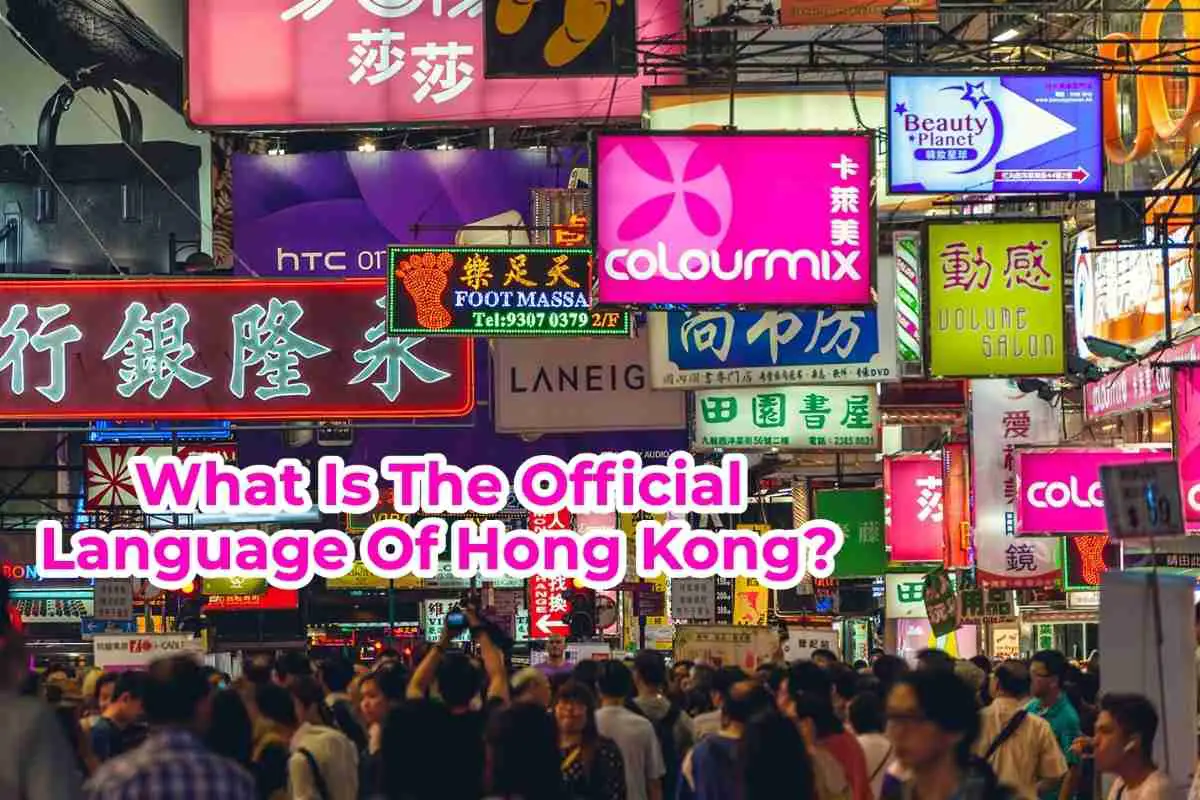If anyone is looking to do business or travel to Hong Kong, it is good to understand the official language of Hong Kong. Hong Kong has always been a melting pot where many languages are spoken.
The official language of Hong Kong is Chinese and English. The residents of Hong Kong are native Cantonese Chinese speakers, so the official language is Cantonese Chinese. Many in Hong Kong can also speak Mandarin Chinese; many local Hong Kong residents prefer to speak Cantonese Chinese or English.
Table of Contents
- Cantonese Is The Official Language of Hong Kong
- English is the Other Official Language of Hong Kong
- Mandarin Chinese – Hong Kong’s Unofficial Language
- Hong Kong’s Preferred Business Language Is Still English
- Related Questions
Cantonese Is The Official Language of Hong Kong
Cantonese is the Chinese dialect that is spoken in Hong Kong. Chinese has many dialects, but the two main dialects are Mandarin and Cantonese.
Mandarin, also known as Putonghua, is the official language of mainland China. Many people in Guangdong Province in Southern China are also native Cantonese speakers.
In 1997, when Hong Kong was handed back to China, only about a quarter of the Hong Kong population could speak Mandarin Chinese. Today, about half of the Hong Kong population is also fluent Mandarin speakers. As Hong Kong has had some political issues with Mainland China, many Hong Kong citizens refuse to speak Mandarin Chinese.
Even though Hong Kong is now an official part of China, the official language is not the same Chinese dialect as a majority of mainland Chinese speak; most Chinese speak Mandarin Chinese or Putonghua.
Even though Cantonese and Mandarin Chinese are both Chinese languages and the writing system is similar, spoken Chinese between Cantonese and Mandarin Chinese is very different. Just because someone speaks Mandarin Chinese does not mean they can understand the spoken Cantonese dialect.
English is the Other Official Language of Hong Kong
The other official language of Hong Kong is English. The courts, government, and all the services in Hong Kong still operate using both English and Cantonese Chinese.
The roads and all public transportation signs also have English and Chinese languages.

Finding taxi drivers in Hong Kong who speak English has always been a touch-and-go situation for me. Sometimes you find drivers who speak perfect English, but I have often found taxi drivers who can hardly speak English.
The two languages can be a problem when using a taxi as the roads in Hong Kong have two names – one that is English and the other in Chinese. I had found many drivers when I told them the English name of the road; they had no idea what I was talking about.

Even in shops, not everyone speaks English. In Hong Kong, almost all people speak English in the areas where the tourists would shop, but today as many of the tourists have come from mainland China, many of the shops have felt it was more critical they speak Mandarin Chinese than English.
English and Chinese Are Written In The Basic Law of Hong Kong
The Basic Law of Hong Kong, the official law of Hong Kong, states what languages are to be used in Hong Kong. These languages are important as the basic government and other services will be in those languages.
Hong Kong’s Basic Law in Article 9 states this about the official languages of Hong Kong:
“In addition to the Chinese language, English may be used as an official by the executive authorities, legislature and judiciary of the Hong Kong Special Administrative Region.”
Basic Law – Article 9
Even though Chinese is only mentioned here in the Basic Law, the Chinese language is used to understand Cantonese as it is the native language of Hong Kong. No one knows if one day that can change, but right now, Cantonese is understood as the official language.
Mandarin Chinese – Hong Kong’s Unofficial Language
As Hong Kong is part of China, Mandarin Chinese has become Hong Kong’s Official yet Unofficial language. Even though many in Hong Kong speak fluent Mandarin Chinese, they may refuse to speak it or not want to speak it, especially to another native Cantonese speaker.
I do not find this much different from living in Guangdong Province, China; whenever there are two native Cantonese speakers, they will always speak Cantonese and will only switch over to Mandarin if they are conversing with someone who does not speak Cantonese.
Today in Hong Kong, you may find that many of the announcements on public and other transportation are in Cantonese Chinese, Mandarin Chinese, and English. This is very different from China, where everything is usually only in Mandarin Chinese.
Hong Kong’s Preferred Business Language Is Still English

If you are going to Hong Kong for Business or even as a tourist, Hong Kong people usually prefer a business language like English, especially a foreigner. In almost every business establishment you visit, you will usually find people who speak excellent English.
Many of the top Universities in Hong Kong conduct classes in English and many of them have English-speaking professors. If a Hong Kong person does not attend University in Hong Kong, many will go to school overseas in the United States, Australia, or the United Kingdom.
The education system in Hong Kong teaches excellent English. Speaking English is not optional but necessary among educated Hong Kong residents and those usually working in an office environment.
I did a Master’s Degree In Chinese Law at the Open University of Hong Kong; all my classes and coursework were in 100% English. We did not have any classes or coursework in Chinese.
All of my Hong Kong classmates could read and write fluent English and do all the coursework in English and not Chinese. We even had 3-hour final exams for each course conducted in 100% English.
My experience studying at Hong Kong University Master’s level shows how bilingual Hong Kong residents are, especially educated people.
I find that the language in Hong Kong makes it a unique place. It is a place where many residents are genuinely bilingual or even trilingual, as they can fluently speak Cantonese Chinese, Mandarin Chinese, and English.
At A Bus On A Dusty Road, we talk about all things to do with travel, life, and ex-pat living. We are all about “Living Life As A Global Citizen.” We explore social, cultural, and economic issues and travel.
We would love to have you be part of our community. Sign up for our newsletter to keep up-to-date by clicking here. If you have any questions, you can contact me, Anita, by clicking here.
Listen to our Podcast called Dusty Roads. You can find it on all major podcast platforms. Try out to listen to one of our podcasts by clicking here.
Subscribe to our A Bus On A Dusty Road YouTube Channel filled with great videos and information by clicking here.
Related Questions
The Philippines And The Tagalog Language
Today, the Philippines has two official languages – English and Tagalog, or sometimes it is called Filipino. Only about a quarter of the Filipino people are native Tagalog speakers; as an island nation, the Philippines has many different dialects and languages. However, Tagalog is a language widely spoken in the Philippines.
By clicking here, you can discover The Philippines And The Tagalog Language.
Why Does The Swedish Language Sound Like Singing?
The Swedish language uses a lot of prosody in the language. It also has unique word stress with long and short vowels or consonants. Swedish uses an acute tone accent or a grave tone accent. When Swedes speak, they will stress the most critical word; and which word they stress can change the entire meaning of a sentence.
You can learn more by reading Why Does The Swedish Language Sound Like Singing? by clicking here.

